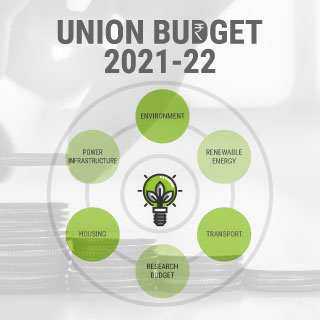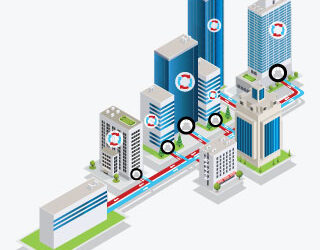Union Budget 2021-22: Through the Lens of Energy and Climate Change

The Union Budget 2021-22, presented by Finance Minister Nirmala Sitharaman on 1 February 2021, is a consolidation of taxation process revisions, modified industry specific policies and provisions, and schemes and interventions to strengthen sectors like agriculture, health, and education.
Below given are budget highlights pertaining to energy and climate change:
Environment and Sanitation
- To tackle the burgeoning problem of air pollution, the government proposed to provide an amount of Rs. 2,217 crores for 42 urban centres with a million-plus population.
- The World Health Organisation (WHO) repeatedly stressed on the importance of clean water, sanitation, and clean environment, as a prerequisite to achieving universal health. Hence, the Jal Jeevan Mission (Urban) will be launched in this fiscal year, aiming at universal water supply in all 4,378 urban local bodies with 2.86 crores household tap connections, as well as liquid waste management in 500 AMRUT cities. It will be implemented over 5 years, with an outlay of Rs. 2,87,000 crores.
- To render urban India clean and hygienic, the government intends to focus on complete faecal sludge management and wastewater treatment, source segregation of garbage, reduction in single-use plastic, reduction in air pollution by effectively managing waste from construction-and-demolition activities, and bio-remediation of all legacy dump sites. The Urban Swachh Bharat Mission 2.0 will be implemented with a total financial allocation of Rs. 1,41,678 crores over 5 years from 2021-2026.
Power Infrastructure
- Distribution companies (DISCOMs) across the country are monopolies, either government or private. Realising the need to provide a choice to consumers by promoting competition, a framework will be put in place to give consumers alternatives to choose from among more than one distribution company.
- The past six years have seen some reforms and achievements in the power sector. 139 Giga Watts of installed capacity has been added, connecting an additional 2.8 crores households and adding 1.41 lakh circuit km of transmission lines. The viability of distribution companies is a serious concern. A revamped reforms-based result-linked power distribution sector scheme will be launched with an outlay of Rs. 3,05,984 crores over five years. This scheme will assist DISCOMS for infrastructure creation including pre-paid smart metering and feeder separation, up-gradation of systems, etc., tied to financial improvements.
- Plans to launch a comprehensive National Hydrogen Energy Mission have been proposed for generating hydrogen from green power sources.
Affordable/Rental Housing
- The government sees ‘Housing for All’ and affordable housing as priority areas. In the July 2019 Budget, it had provided an additional deduction of interest, amounting to Rs. 1.5 lakh, for a loan taken to purchase an affordable house. This year’s budget has proposed to extend the eligibility of this deduction by one more year, till 31 March 2022. The additional deduction of Rs. 1.5 lakh shall therefore be available for loans taken up till 31 March 2022, for the purchase of an affordable house.
- To keep up the supply of affordable houses, the budget proposed for affordable housing projects to be able to avail a tax holiday for one more year till 31 March 2022.
- To promote the supply of affordable rental housing for migrant workers, tax exemption for notified affordable rental housing projects has been proposed.
Renewable Energy and LEDs
- To build up domestic capacity for solar energy utilisation, phased manufacturing plan for solar cells and solar panels has been notified.
- To encourage domestic production, custom duty on solar inverters has been raised from 5% to 20% and on solar lanterns from 5% to 15%.
- Custom duty on inputs and parts of LED lights or fixtures including LED Lamps has been raised from 5% to 10%.
Vehicle Scrapping Policy to Encourage Environment-Friendly Vehicles
- The government announced a voluntary vehicle scrapping policy, to phase out old and unfit vehicles. This is expected to encourage fuel efficient, environment friendly vehicles, thereby reducing vehicular pollution and oil import bill.
- Vehicles would undergo fitness tests in automated fitness centres after 20 years in case of personal vehicles, and after 15 years in case of commercial vehicles. Details of the scheme will be separately shared by the Ministry.
Research Budget
- In July 2019, the formation of National Research Foundation had been announced in the then budget. The modalities and the NRF outlay will be of Rs. 50,000 crores, over five years. This will ensure that the overall research ecosystem of the country is strengthened with a focus on identified national-priority thrust areas.
Compiled by Shruti Saraf, Consultant, Alliances & Communications
Tags
Air-condition
Appliances
bee
BIS
BMS
Building Management System
carbon emissions
CEEW
Charging station
Charging technology
CIFF
climate action
climate change
Cold Chain
Cold Chain cooling
Commercial building
cooling
Coronavirus
COVID-19
decarbonisation
earth day
Electric buses
Electric grid
electricity
Electric Mobility
Electric Vehicles
Energy-efficient homes
Energy Access
Energy Efficiency
Energy efficient
Energy storage
Eurovent Certita Certification
EV Charging
Future ready
GHG Emissions
global warming
Green buildings
Green offices
India Cooling Action Plan
India’s best office spaces
Infrastructure
Innovation
ISHRAE
LED lighting
Lighting system
lockdown
MoEF&CC
New office
pandemic
paris agreement
Power demand
Power supply
Renewable energy
Residential building
SHEETAL
sustainable communities
Sustainable development
TERI
Thermal Comfort
U4E
Vaccines
Ventilation
Workspace




